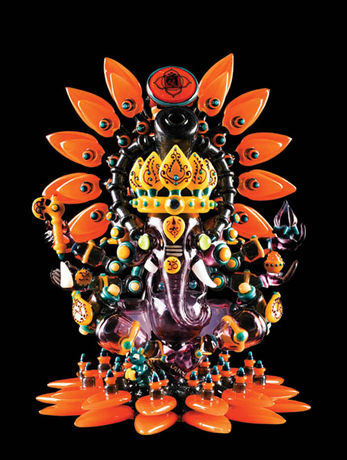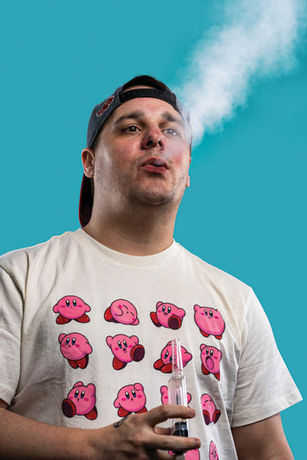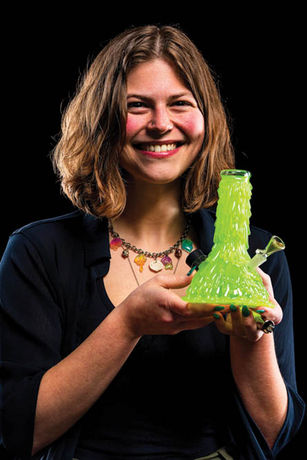Jenn Doe’s story is that of a mother, a pioneer, a Cannabis Cup-winning hash maker in a male-dominated scene, a survivor of a near death experience, and a fighter for the right to use and share plant and animal based medicines. As a patient herself using Cannabis to combat symptoms of Long Lyme Disease, she’s researched and embarked on a journey for health that has included using African Tree Frog Kambo therapy, snake and tarantula venom treatments, and plant-based medicines like psilocybin and other psychedelics to heal her body, mind and spirit. We sat down with Jenn over Zoom from Utah – her childhood home that she’s now returned to, spreading the good word of Cannabis and helping remove the stigma surrounding patients and recreational users alike.
How did you start your relationship with Cannabis?
When I was 14 I started smoking. My parents were closet smokers – they kinda hid it from me – and friends at school wanted to smoke. When I was 16, I got my hands on my first seeds and grew them out in my closet. By then my parents weren’t so awful about it, but my mom did keep telling me to get rid of the plants because they were stinky.
Did you fall in love with growing from the start?
I did! It was so expensive to buy it and I realized that I could take my own seeds and grow this plant. … My first grow setup was literally my closet. Back then it was really hard to find any information about growing and we didn’t bring it up because it was so illegal. When I could get my hands on High Times, I read it – but even that was very rare to stumble across at a 7-11.
How did you get involved in the medical side of Cannabis?
My grandmother had cancer, and I had been selling weed on the black market. I’d heard that Cannabis was helpful for cancer, and I was finally able to gather enough info to present to her as an alternative to eliminate the cancer. I had all this weed, but I didn’t know how to make it into medicine. By the time I figured it out, my grandma actually died – so that was very hard for me. I still feel that if I had access to the information, I could have helped more – which drove me into the medical aspect of Cannabis even further.
How did it feel to go from the restrictive Utah environment into the more open, medical Cannabis world?
When I moved to Washington in 2013 [where medical and recreational use were legal], I realized that I could share this info and not be worried about someone hunting me down and throwing me into prison. So I decided to share as much as I could! Coming from Utah, it was very freeing. It took a long time to get out of the Utah mindset of being anxious about smoking Cannabis somewhere that wasn’t hidden.
Once you settled in, you started making solventless ice water hash – how did that happen?
When I first started, I was shooting in the dark. I’d made old-school pressed hash, but I had no idea if I was making the six star-style bubble hash right. I had been pushed out of a BHO lab because I was a girl and my partners didn’t give me that opportunity … I wanted something that could be mine, so I started making hash!
You went for gold with it and won a High Times Cannabis Cup, and you’re still the only woman to grow and process a single-source hash entry and win!
I entered originally as more of a tribute and paying my respect to one of the only sources of info I could find. It was fun to be pioneering, and I entered not thinking I had any chance of winning. When I won the Cup, it was only my eighth time washing hash. I was like, wait – I did this, right? It was complete imposter syndrome – a little scary, and very unexpected.
As a pioneering woman in Cannabis, how does it feel to shine a light on women’s talents?
I think there’s a lot of women in the industry that have always stayed behind the scenes with too little credit, or without any at all. There’s different reasons other than the obvious male egos and industry, and a lot of it comes back to mothers needing to take care of their kids. In the early days, that kept women behind the scenes so we didn’t make ourselves a target. It was challenging for me because I did feel like I had a target [in the past], but I felt that it was important not to be afraid of that.
How does it feel to help others with medicine now?
It doesn’t change that I couldn’t help my grandma, but knowing her circumstances brought all this together … is very heartfelt. Even before I knew Cannabis was medicinal, I knew it was doing something positive – that it improved my focus and helped with headaches and cramps or back pain. Cannabis was doing something for me and people I interacted with, even when I wasn’t conscious of what it was doing.
It’s also helped you overcome the trauma of a horrific accident. How did Cannabis help?
I was in a freak accident … a car went into a river and I was trapped, and my friend Harland Ryman died. The hardest part of the PTSD stemmed from the fact that I got us out of the car once it was sinking, to save his life – and then he helped save me, and then died. I had a lot of survivor’s remorse and guilt. There’s so many things in that whole situation that really fucked me up, but that was the worst. How do you watch someone you just saved, die?
Was going into the garden a form of therapy in your recovery?
Growing definitely helped me through all of that – being in the garden as therapy, to sit quietly. To have a reason to step away from the kids and have a space to go and know that I was helping people again was empowering. Weed allowed me to help people when I wasn’t able to help Harland.
After your accident, and a tick bite later gave you Lyme Disease, you began searching beyond Cannabis for plant and animal medicines that could help you heal and recover. What pushed you to try those alternative medicines?
You have to be in a place in life where you feel so hopeless, that you can search out these different things. Also, I’ve always been open to psychedelics and used them previously. I actually did acid before I tried weed, because Utah put such a big ‘no-no’ on weed, we didn’t hear about acid. So when I was a kid, acid was less scary than weed.
What was the effect of Lyme Disease like?
The tick bite fucked me up really bad. I have Lyme Disease and five other co-infections. It affects everything, really – your nervous system and your brain’s ability to communicate with your organs properly. I was having a lot of weird heart situations but it wasn’t my heart, it was the signals my brain was sending to my heart. So I would be exhausted all day and then during sleep, my heart would race – so I would wake up feeling like I ran a marathon. The signals were backwards to my heart, all because of the neurological issues with Lyme Disease.
That sounds terrible. So, with the doctors unable to help, you had to take matters into your own hands?
I’ve had migraines since I was five years old. They put me in the ER all the time, and the doctors would either say I was lying, or put me through the ringer on a bunch of migraine and epilepsy and pain meds. So I don’t have a whole lot of trust in doctors. I’d rather research and try medicines that other cultures have used for thousands of years. And if we really look at pharmaceutical companies suppressing traditional medicines and designing drugs from them – including Cannabis – it’s all been for profit, not for truth.
What was using the frog venom, Kambo, like? How did it help?
I started microdosing Kambo and that seemed to help. It’s like giving yourself the worst flu you’ve ever had in your life for about 20 minutes. They make little burns and they put the medicine on those burns to get it into your lymphatic system … while it’s on there, you’re as sick as can be in every way, from puking to shitting to sweating to crying – it’s like a full purge of everything. Once you wipe the serum off, within a couple minutes all those terrible feelings go away. And then you feel very tired.
So this isn’t something that gets you high?
You dont feel better right away, but it puts you to rest and you feel rejuvenated afterwards. It’s not to get high – it’s kind of like viewed as a full body detox. The peptides and alkaloids in the frog excretion work with the body in harmony to correct issues, including emotions.
What else have you done that’s helped from the plant world?
I also microdose mushrooms, which is very helpful for mental and physical health. My body pains aren’t as bad when I am microdosing, and it’s helpful with my sleep patterns to relax me enough to help with my heart situation. Another alternative I’ve used are flower essences and herbs. I worked with a woman in Maine – utilizing herbs for the physical body and flower essences for the energetic body – and using them together helps with your energy field and your body. You can’t fix one without fixing the other.
How did you make the leap to snake venom?
I went down to Mexico after a lot of research. If you look into snake venom, many pharmaceutical drugs have been created from it. It felt very different from Kambo. I didn’t feel much of anything with some of the venoms, but I was learning to be an administrator – so I tried 10 different venoms that all do different things. There are three different categories of snake venom: One is Hemotoxic and works with your blood, one is Cytotoxic and used for cancers because it kills cells, and the Neurotoxic venoms can be helpful for the brain and neurological systems.
That treatment is illegal in the U.S., and dangerous, right?
The biggest reason it’s illegal is gatekeeping for pharmaceutical companies, but I do understand that it can literally kill you. So if you are inexperienced, venom can be fatal – in small doses, however, it has such different effects. One of the venoms made me feel like I’d taken Adderall for my addiction – I had a noticeable change in my focus when I took the monocle cobra, a forest cobra.
Do you see this journey of plant and animal medicines being your focus as you heal yourself, then looking to help others by sharing your experiences?
I’ve always been a healer, so now it’s expanding into other modalities. It’s no different than when I started in Cannabis. I didn’t have the information I needed – and once I did, I turned around and started helping. This isn’t just for me … it’s to have the experiences and the knowledge to help others discover things – without going to the crazy lengths I do for these experiences!










